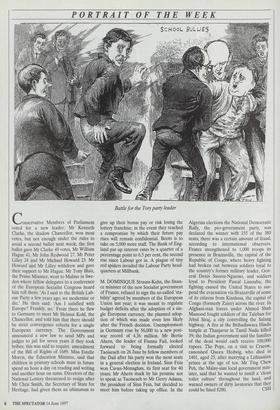PORTRAIT OF THE WEEK
Battle for the Tory party leader Conservative Members of Parliament voted for a new leader; Mr Kenneth Clarke, the shadow Chancellor, won most votes, but not enough under the rules to avoid a second ballot next week; the first ballot gave Mr Clarke 49 votes, Mr William Hague 41, Mr John Redwood 27, Mr Peter Lilley 24 and Mr Michael Howard 23. Mr Howard and Mr Lilley withdrew and gave their support to Mr Hague. Mr Tony Blair, the Prime Minister, went to Malmo in Swe- den where fellow delegates to a conference of the European Socialist Congress heard him tell them: 'As I said to the British Lab- our Party a few years ago, we modernise or die.' He then said: 'Am I satisfied with Europe? Frankly, no.' From there he flew to Germany to meet Mr Helmut Kohl, the Chancellor, and told him that there should be strict convergence criteria for a single European currency. The Government announced a new law to send MPs and judges to jail for seven years if they took bribes; this was said to require amendment of the Bill of Rights of 1689. Miss Estelle Morris, the Education Minister, said that children in primary schools must in future spend an hour a day on reading and writing and another hour on sums. Directors of the National Lottery threatened to resign after Mr Chris Smith, the Secretary of State for Heritage, had given them an ultimatum to give up their bonus pay or risk losing the lottery franchise; in the event they reached a compromise by which their future pay rises will remain confidential. Boots is to take on 5,000 more staff. The Bank of Eng- land put up interest rates by a quarter of a percentage point to 6.5 per cent, the second rise since Labour got in. A plague of tiny red spiders invaded the Labour Party head- quarters at Millbank.
M. DOMINIQUE Strauss-Kahn, the finan- ce minister of the new Socialist government of France, refused to sign the so-called 'sta- bility' agreed by members of the European Union last year; it was meant to regulate budget deficits after the adoption of a sin- gle European currency, the planned adop- tion of which was made even less likely after the French decision. Unemployment in Germany rose by 56,000 to a new post- war record of 4.36 million. Mr Bertie Ahern, the leader of Fianna Fail, looked forward to being formally elected Taoiseach on 26 June by fellow members of the Dail after his party won the most seats in a general election in Ireland. Sinn Fein won Cavan-Monaghan, its first seat for 40 years; Mr Ahern stuck by his promise not to speak as Taoiseach to Mr Gerry Adams, the president of Sinn Fein, but decided to meet him before taking up office. In the Algerian elections the National Democratic Rally, the pro-government party, was declared the winner with 155 of the 380 seats; there was a certain amount of fraud, according to international observers. France strengthened to 1,000 troops its presence in Brazzaville, the capital of the Republic of Congo, where heavy fighting had broken out between soldiers loyal to the country's former military leader, Gen- eral Denis Sassou-Nguesso, and soldiers loyal to President Pascal Lissouba; the fighting caused the United States to sus- pend the evacuation via Brazzaville of some of its citizens from Kinshasa, the capital of Congo (formerly Zaire) across the river. In Afghani-stan forces under Ahmed Shah Massood fought soldiers of the Taleban for Jebul Siraj, a city controlling the Salang highway. A fire at the Brihadiswara Hindu temple at Thanjavur in Tamil Nadu killed 39; the Indian government said the families of the dead would each receive 100,000 rupees. The Pope, on a visit to Cracow, canonised Queen Hedwig, who died in 1401, aged 25, after marrying a Lithuanian prince at the age of ten. Mr Ting Chew Peh, the Malay-sian local government min- ister, said that he wanted to instill a 'clean toilet culture' throughout the land, and warned owners of dirty lavatories that they










































































 Previous page
Previous page